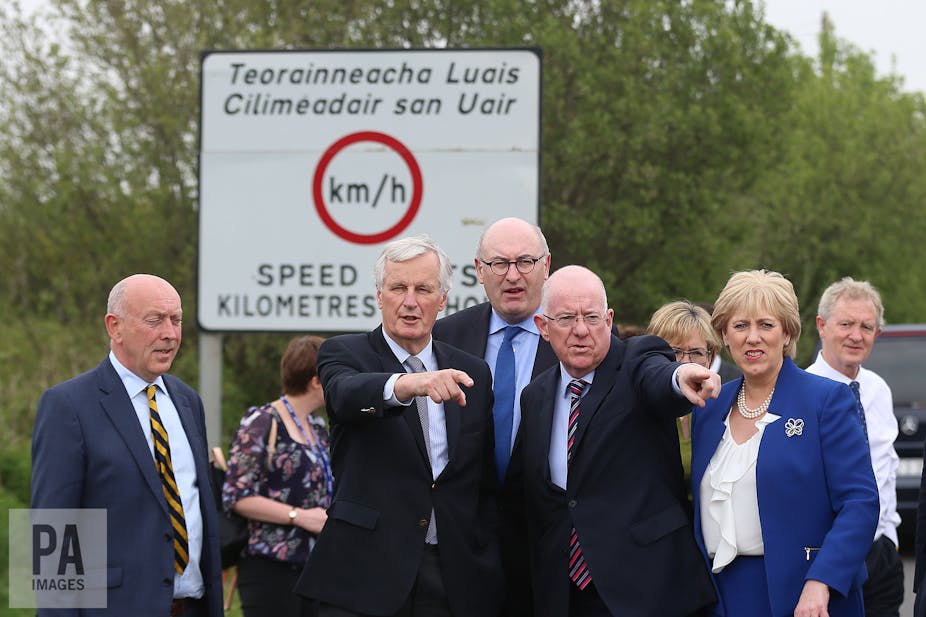The European Commission has announced the guiding principles for its position regarding the border between Ireland and Northern Ireland after Brexit.
The main message is that, when all is said and done, the solutions to this knotty problem lie in the hands of the UK government. As Irish Taoiseach Leo Varadkar wryly remarked, “it’s Britain that has decided to leave”, and so it must manage the consequences of this decision.
At the same time, the commission is concerned that the UK government’s approach to the Irish border has so far centred fairly narrowly on preserving its “invisibility”, on the Common Travel Area, on the rights of Irish citizens, and on funding for peace programmes. Chief negotiator Michel Barnier has also called out the UK government for attempting to use the EU’s flexibility for the Irish border as a test case for the future UK-EU trading relationship.
In its own guidelines, the EU is attempting to move the discussion forward by outlining a framework for solutions that are unique to Northern Ireland.
A unique situation
The EU is in an extraordinary position here, and, reflecting that, uses one word in particular numerous times in its guidelines: “Specific”. Barnier states that, in the case of Northern Ireland and the Irish border, “the specific situation is a specific responsibility” for both the UK and EU.
The emphasis upon the particularity of this case is important for two reasons. First, the commission is keen to emphasise that what happens in Northern Ireland will not set a precedent for elsewhere in the EU or on its borders.
Second, it wants to draw clear water between what is arranged for Northern Ireland and what pertains to the rest of the UK. A level of flexibility is on offer in this case that cannot be expected for other elements of the Brexit negotiations.
The commission is also clear that this flexibility will only work if it comes from both sides. It claims to have seen little of this so far from the UK. This is despite the fact that the British government legally cannot treat Northern Ireland and its future as of purely domestic concern. The Irish government has a legitimate role and interest in the affairs of Northern Ireland. As the DUP is well aware, Margaret Thatcher herself conceded this in the 1985 Anglo-Irish Agreement.
The EU, peace and cross-border co-operation
In light of this, the EU recognises that the peace process is not merely about symbolism or visibility of borders. The agreement has a “practical application” across its three strands – unionist/nationalist, north/south and British/Irish. Co-operation along these three lines must be protected in order to shore up peace. The commission is concerned that, because European Union law and policy underpins so much of this cooperation, it is put at very real risk by Brexit.
The implication is that sustaining the peace process in Northern Ireland will require continuity in policy areas most relevant to cross-border cooperation. To make that happen, the EU is suggesting adding specific provisions in the Brexit withdrawal agreement for the continued application of EU law in Northern Ireland.

It hints (from a position grounded in the 1998 agreement) that this may be done across a wide range of policy areas, including health, social security and the environment. Here the EU is setting out a broad field of possibilities for the UK to seize upon, including continued application of EU law and policy in a region of the UK after Brexit.
Flexibility now required of the UK
The unique situation of Northern Ireland within the UK again needs to be stressed. Core to this is the birthright of people born there to identity as British, Irish or both. These EU guidelines go further than ever before in stating that Brexit should come “without prejudice” to the “rights, opportunities and identities” that come with EU citizenship for Irish citizens in Northern Ireland. What is more, as co-guarantor of the Good Friday Agreement, the UK will have to ensure that there is no diminution of those rights in Northern Ireland after Brexit.
If the UK government seizes this opportunity to soften the fallout of Brexit on the peace process, it will need to be prepared to make the case for unique post-Brexit arrangements for Northern Ireland. This would have to be sold to its own supporters, including the ten pro-Brexit DUP Westminster MPs on whose vote it currently relies. The EU is making an exceptional offer for peace; to seize it will require new levels of flexibility and nerve from the UK government.

